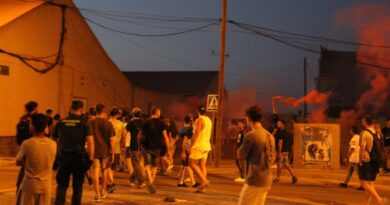Spanish state: From the dark room to the "aubergine"
We share the first reflections on the presidential elections of 23J. The PP triumphed, but without enough votes to govern with Vox, who suffered a severe fall. There was no far-right “Meloni effect”. The PSOE came second, but Pedro Sánchez could continue in power. There is also the possibility of a new electoral call. The '78 regime falls into uncertainty again. To take advantage of the opportunities that reality offers, the extreme left needs to change course. There is a great challenge for revolutionary socialists.
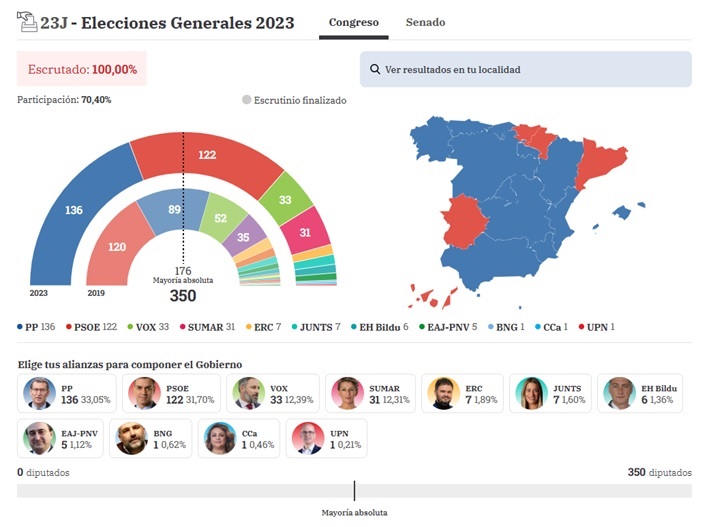
The main results
The participation was 69%, a 3% more than in the presidential elections of 2019. The Popular Party (PP) won with him 33,05% of votes (136 MPs). The Spanish Socialist Workers Party (PSOE) came second with him 31,70% (122 MPs), the Catalan vote being decisive where its subsidiary, the Party of Socialists of Catalonia (PSC) won by a wide margin. SUMMER (Yolanda Díaz's party, second vice president of the current government), arrived at 12,31% (31 MPs). The extreme right of Vox took the 12,39%.
Among the variants of nationalities, the Basque Nationalist Party (PNV) lost supremacy over Euskal Herria Bildu (EH). Republican Left of Catalonia (ERC) Together for Catalonia (JxCat) and the Popular Unity Candidacy (CUP) They have lost votes and seats. The Galician Nationalist Bloc (BNG) revalidated the deputy he had and Adelante Andalucía made a poor election.
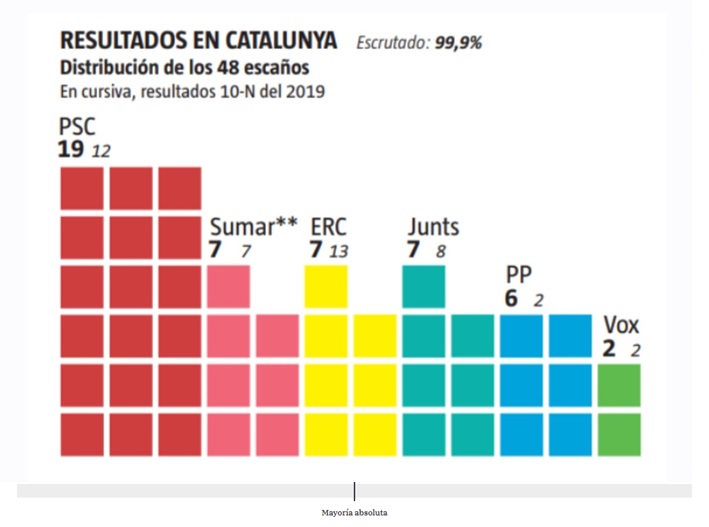
Some reflections
The PP and the PSOE brought together the 64,75% of votes (258 deputies on 350 to choose) with which the bipartisanship has regained energy. The PP won the elections fueled by the votes that Vox and Ciudadanos lost, who did not appear in the race. The growth of the popular was important, although lower than expectations. Vox, that had advanced28M, lost 600.000 votes and went from 52 a 33 MPs, which is a significant loss. Thus, The PP and Vox could not reproduce the victories obtained in dozens of town councils and the autonomies of Valencia and Extremadura to reach central power.
The electoral advance has allowed the PSOE to maintain Pedro Sánchez's chances of governing again. In the reformist space there will be reconfigurations from the first presentation of SUMAR and the ongoing setback of Podemos.
Sin“Meloni effect”
Most surveys and organizations overstated the “turn to the right” and placed it as imminent.. But a sector of the mass movement decided to avoid the “Meloni effect” (understood as the arrival of the extreme right to power) voting for PSOE and SUMAR, still dissatisfied with the government. The absence of a revolutionary leadership with mass influence is a weakness that manifests itself permanently..
The truth is that the growth of the most reactionary sectors is facilitated by the reformists in power, who make false promises, increase inequality, They deteriorate the standard of living and let the neo-fascists operate institutionally as they wish.

The possibilities of forming a government
To form the next Executive, it is necessary 176 seats, before which different options are considered. The first is for Pedro Sánchez to get the support of SUMAR, EH, PNV, ERC and JxCat and according to an investiture block similar to the one in 2019 allowed Rajoy to win the motion of censure. What bills will they pass to Sánchez to allow him to continue in La Moncloa?? How weak and unstable would such a government emerge??
The key to the investiture seems to be in the hands of JxCat, since if he abstains, Sánchez will take over. What will its leader Carles Puigdemont decide?, who demands amnesty from exile, He has an extradition order from the Spanish justice system and has lost his European parliamentary immunity.? In the first days after elections, The former Catalan president has expressed his willingness to talk with Sánchez.
If JxCat decided to vote no to the investiture, new elections would have to be called at the beginning of 2024. Who would win them? Would a similar scenario remain or would it change drastically?? Sánchez made it clear that he wants to avoid an electoral repetition and predicted that: “This democracy will find the formula for governability”.
On the other hand, the candidate for president PP, Alberto Núñez Feijóo, demands the right to govern as a minority, for which the abstention of the PSOE would be needed. The Spanish State and the '78 regime have returned to“get into trouble”, that of a country with recurring crises and renewed uncertainties.
The present and the perspective have activated the alarms of the European Union and the Spanish Confederation of Business Organizations (CEOE), who has asked for responsibility to form a government“stable and moderate”.
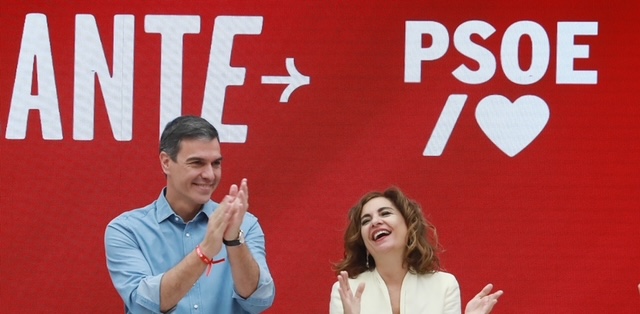
A necessary balance
forward Andalucía, the project promoted by Anticapitalistas obtained only 9.064 votes (0.2%) and was left without representation in Cádiz. In Catalonia the CUP lost the two deputies it had and around half of the votes. It is a fact that does not appear as an alternative to the retreat of ERC and JxCat, caused by the surrender to the 1-O Referendum and the massive mobilizations for self-determination. Regrettably, the great beneficiary was the PSC, a pillar of the regime and155.
Why don't they appear as an alternative??
Anticapitalistas blurs the limits of class independence and replaces revolutionary objectives with a project of “progressive” regionalism. The reasons that led the CUP to the current situation will be the subject of analysis among the militants of that organization.. Fraternally, We express our opinion based onvote critically for the CUP and to share the struggles.
The CUP claims to be anti-capitalist, but it makes investiture and government agreements with ERC. Call for mobilization and self-organization, but he approaches the reformists to prioritize entry into the institutions, without prioritizing an installation orientation in the working class. It is presented in Catalonia, but it rules out the dispute at the level of the Spanish State. Propaganda his politics, but it constantly changes public figures. They are contradictions that are repeated and have an increasingly higher cost..
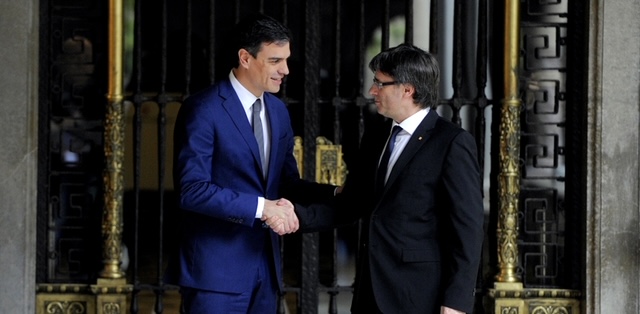
For an extreme left front
Beyond the nuances, whoever becomes president, will continue to cause more poverty and inequality under the orders of the EU imperialists. Allowing inflation to liquefy salaries without increasing them as necessary. Supporting reactionary measures such as the gag law and labor reform.
capitalist crisis, The erosion of social democracy and reformism opens great opportunities to intervene in the class struggle and political processes. It is a process that is in its beginnings and that will be deepened. To take advantage of the opportunities that reality offers, It is necessary to build a front of the radical left that today does not have a solid expression, united and extended.
From Socialism and Freedom (SOL) – Spanish State we appeal to the CUP and Anticapitalists to change course and call to build afar left front with an anti-government program, the '78 regime and the capitalist system. An attractive and useful alternative for the working class, feminist movements, environmentalists and defenders of migrants. An unavoidable reference in the street fight against neo-fascists and the extreme right. With proposals that range from immediate needs to underlying needs: let the workers rule and socialism.
In the same way, we call for reflection to the CRT, Red Stream, Revolutionary Left and Internationalist Struggle, on the way to achieving a confluence. It is a great challenge that we revolutionary socialists have before us..



